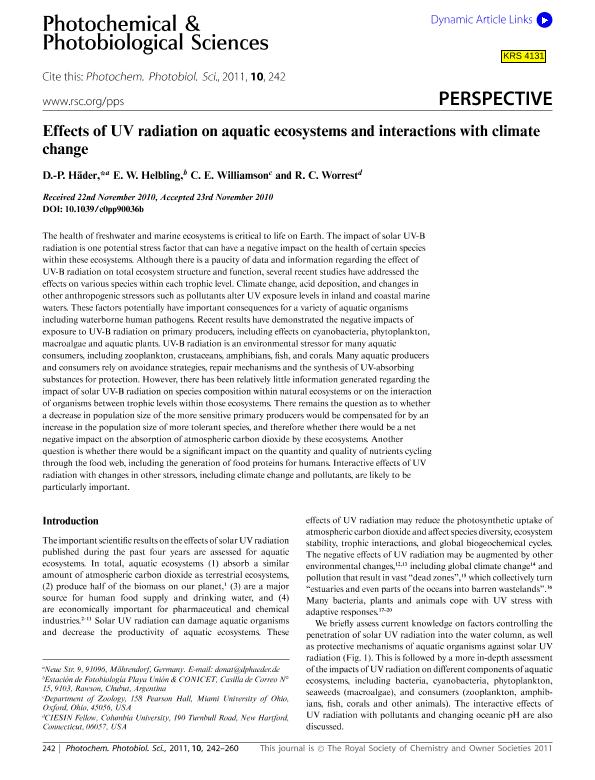Artículo
Effects of UV radiation on aquatic ecosystems and interactions with climate change
Fecha de publicación:
02/2011
Editorial:
Royal Society of Chemistry
Revista:
Photochemical and Photobiological Sciences
ISSN:
1474-905X
Idioma:
Inglés
Tipo de recurso:
Artículo publicado
Clasificación temática:
Resumen
The health of freshwater and marine ecosystems is critical to life on Earth. The impact of solar UV-B radiation is one potential stress factor that can have a negative impact on the health of certain species within these ecosystems. Although there is a paucity of data and information regarding the effect of UV-B radiation on total ecosystem structure and function, several recent studies have addressed the effects on various species within each trophic level. Climate change, acid deposition, and changes in other anthropogenic stressors such as pollutants alter UV exposure levels in inland and coastal marine waters. These factors potentially have important consequences for a variety of aquatic organisms including waterborne human pathogens. Recent results have demonstrated the negative impacts of exposure to UV-B radiation on primary producers, including effects on cyanobacteria, phytoplankton, macroalgae and aquatic plants. UV-B radiation is an environmental stressor for many aquatic consumers, including zooplankton, crustaceans, amphibians, fish, and corals. Many aquatic producers and consumers rely on avoidance strategies, repair mechanisms and the synthesis of UV-absorbing substances for protection. However, there has been relatively little information generated regarding the impact of solar UV-B radiation on species composition within natural ecosystems or on the interaction of organisms between trophic levels within those ecosystems. There remains the question as to whether a decrease in population size of the more sensitive primary producers would be compensated for by an increase in the population size of more tolerant species, and therefore whether there would be a net negative impact on the absorption of atmospheric carbon dioxide by these ecosystems. Another question is whether there would be a significant impact on the quantity and quality of nutrients cycling through the food web, including the generation of food proteins for humans. Interactive effects of UV radiation with changes in other stressors, including climate change and pollutants, are likely to be particularly important.
Palabras clave:
CLIMATE CHANGE
,
UVR
Archivos asociados
Licencia
Identificadores
Colecciones
Articulos(SEDE CENTRAL)
Articulos de SEDE CENTRAL
Articulos de SEDE CENTRAL
Citación
Häder, D. P.; Helbling, Eduardo Walter; Williamson, C. E.; Worrest, R. C.; Effects of UV radiation on aquatic ecosystems and interactions with climate change; Royal Society of Chemistry; Photochemical and Photobiological Sciences; 10; 2; 2-2011; 242-260
Compartir
Altmétricas




